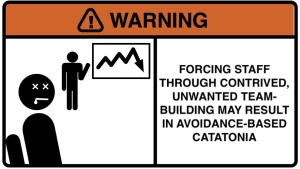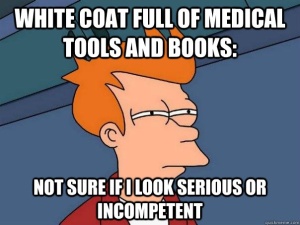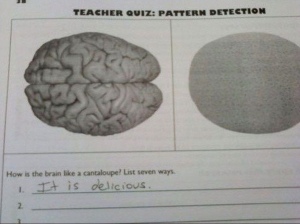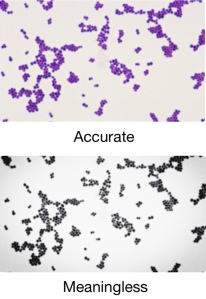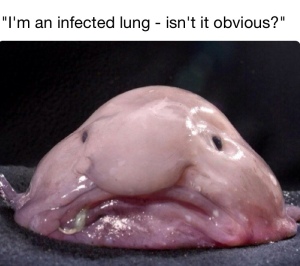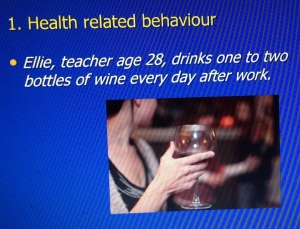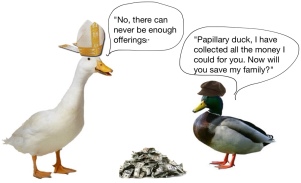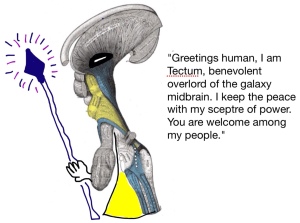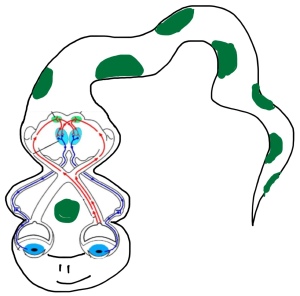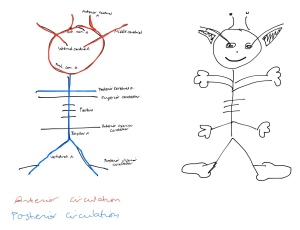This is actually kind of a retrospective post. The event in question happened a few months ago but I got too swept up in exam mayhem to remember to write about it. Anyway, since I am shortly to be beginning clinical teaching it seems like a relevant thing to discuss. Basically what happened is the powers that be decided we should spend half a day in a simulated clinical environment. This involved about half our graduate cohort (25-30 people) turning up to the training rooms of the local hospital where a variety of “bays” had been set up, each purporting to represent a different time of day. Milling around were people playing nurses and consultants (some of whom I think actually were nurses and consultants), and each bed contained either an “patient” or a mannequin with an accompanying “relative”. We were separated into groups of about 10 and given an hour and a half to tend to the “patients” using whatever division of labour seemed most appropriate. Right away the group polarised into those who were happy or eager to take charge (not me) and those who were happy to be manoeuvred into position (definitely me). I must say that I had reservations before the day began regarding how realistic the scenario would be, and since this kind of enforced role playing sits fairly ill with me at the best of times I contended myself by selecting a partner and letting the (extremely nice) ex paramedic of the group take care of the details. It was decided that in pairs we would each assess a patient and then reconvene to make sure we all knew what was going on. This was our first mistake. Not because it wasn’t a good idea, but because it was never going to happen. As soon as we got anywhere near the beds the fake patients and their families started barking overly rehearsed demands at us and all thoughts of a secondary pow-wow were well and truly lost. My partner and I approached the bed cautiously and upon realising that we’d been stuck with a mannequin began addressing our concerns to the “wife”. Now, it is still unclear to me whether this woman had been primed to be the most objectionable person on the planet or whether that was her natural state, but for the purposes of the simulation it didn’t really matter. Nervously we began to take a history.
“Can you tell us a little about why your husband has come to the hospital?” we asked in our best reassuring-yet-competent voices.
“Well he’s been having some pain in his stomach” replied the wife, wringing her hands and rolling her eyes, “he needs to get some pain killers and to go home”.
Excellent, we thought. Stomach pain – a straight forward how, when and what. This is how little we understood of the hell we were entering.
“So” we rejoined, “when did the pain first beg…”
“PAIN KILLERS!”
We stopped, blinking into the red face of the formally docile actress, now fixing us with a stare that would put the wind up Vinnie Jones.
“Um, yes” we said, unsure what to do next, “well, we’ll get him some pain killers as soon as we can, we just need to ask a few more ques…”
“Well fine, why don’t you just get on with it then?” shrieked the banshee.
A few falteringly asked and curtly answered questions later the wife lapsed back into her original chant of screaming the word pain killers again and again, and my friend and I timidly scuttled off to find someone capable of prescribing fake drugs to a fake human being pretending to be a fake patient. After queuing for an unendurably long time we finally got our turn with the consultant.
“Um, we have a patient.. he um, needs painkillers?”
The consultant fixed us with an upraising stare.
“Are you asking me or telling me?”
“Um, telling you?”
“Presenting history?”
We did our best. It wasn’t good enough. Eventually the consultant sent us back to the wife to take a more complete history. On the way back my partner astutely suggested that maybe the patient had cancer which had metastasised. We asked a few more pointed questions and managed to elicit that the patient had had a cough for a while. OK, lung cancer could fit, but not on the strength of a cough alone. We asked as many questions as we could think of but couldn’t find a single other indication of lung cancer. As if she’d read our minds the nurse (“nurse”?) came over with our patient’s notes and there on the very first page were the words “biopsy completed, no lung cancer found”. At that point we unanimously (and I think appropriately) decided to rule out lung cancer. This was our second mistake.
Finally we managed to extract ourselves once more and returned to the consultant with the most comprehensive history anyone has ever taken. He listened, nodded, and occasionally interrupted with questions, the answers to which often began with the phrase “his wife told us…”.
“Hang on a second” he interjected, “Why is his wife doing all the talking? Why can’t the patient talk for himself?”
Silence.
“Because… because he’s made out of plastic?”
Wrong answer. Back we had to go once again to ask the wife why her imaginary mannequin husband wasn’t answering our questions. Now, I may not be the sharpest nail in the graduate cohort tool box but I flatter myself that even I, if presented with a living patient who refused or was unable to speak for himself, would probably think to ask why. Anyway, disbelief now fully suspended I began to perform a GI physical exam on the mannequin. This involved me palpating his hard plastic stomach while his wife said things like “it hurts more when you press there”. After palpating I had to confess that I hadn’t brought my stethoscope and therefore could not listen to the patient’s bowel sounds.
“Well” the wife said smugly, “it’s not like you were going to hear anything anyway, was it?”
No kidding! I wasn’t really palpating his distended bladder either though, was I? Either I’m supposed to be treating him like he’s alive or I’m not.
At this point time is running low and I’m running dangerously thin on patience. We go back to the consultant to make one last desperate plea for painkillers and to find a nurse to put a catheter in to relieve our patient’s bladder. Neither quest was fruitful. Now I’ve never worked in a hospital before, but I am fairly certain that a full diagnosis is not required in order to get a few lousy paracetamol. Still, once again we had to return to our patient and tell the, now livid, wife that we couldn’t get any painkillers. It was at this point that we made our third big mistake.
CRASH
We turned around and saw that the husband of the patient in the neighbouring bed had collapsed to the floor and was being anxiously tended to by the 3 medical students on his case and the nurse who was supposed to be placing our catheter. When we asked what was wrong the former paramedic told us that the man was diabetic and having a hypoglycaemic fit. 5 minutes and a rich tea biscuit later the man was fine and the nightmare was able to continue as before. This basically involved another few minutes of the wife yelling at us for not having given her husband painkillers, us trying to explain that painkillers actually need to be prescribed and cannot in fact just be swiped from a draw, and no, taking her husband home again without a diagnosis was probably not going to help the situation. Finally the woman in charge called time on the horror show and we were allowed to take our seats around the “bay” to get our feedback from the fake patients. It was at this point I began to suspect that our patient’s wife was not in fact just assuming a character role. Among our many failings was not managing to get any painkillers (who saw that one coming?), not going to help our fellow medical students when the other patient collapsed (because 4 competent professionals who are handling a fairly mundane situation, and who have not asked for help, will be nothing but grateful if 2 other people start trying to intervene), and the fact that we kept going off to see the consultant in pairs instead of taking it in turns to stay with her. Now, on the last point I actually agree with her, and in fact as we were doing it we both knew it wasn’t best practise, but in all honesty both she and the consultant were so intimidating that I think we needed the moral support. Then came the piece de resistance, the wife looked us dead on and said “to be honest I was very disappointed that you didn’t even figure out he had lung cancer.”
We didn’t even figure out he had lung cancer. You mean, despite him having exactly 1 symptom of lung cancer, no history of any type of cancer, and actually having the words “not lung cancer” written in his notes, we didn’t manage to figure out that he had lung cancer. That is truly astonishing.
When I voiced this objection I was greeted with the rather condescending “do you believe everything you read in the notes?”
Yes. Or to be more accurate, yes, when the notes agree with the physical evidence. For example, when the female patient of some other students had a vasectomy mentioned in her notes, those students were within their rights to question the accuracy of said notes. I’m all for a healthy dose of scepticism, but to think that it’s reasonable to question and even reorder every test mentioned in a patient’s notes, especially when the results of those tests agree with your history, is just ludicrous.
And so at length we walked that long road out of hell and came blinking once more into the light of day. How would I rate the experience? Well, aside from being a simulation seemingly designed with my exact flavour of social anxiety in mind, it did have some valuable points to make. Patients lie, or are obnoxious, or deliberately obstructive. Nurses and other doctors cannot always deal with your requests promptly. Patience is not always easy to come by, and more often than not forcing another smile may feel like a precursor to peptic ulcer disease. These were valuable lessons, and I take them to heart. What was not valuable was mandating us to take half a day away from revision in order to rub our faces in the fact that sometimes people suck. I know that people suck. I’ve met them. I’m over it. Equally invaluable was expecting us to perform skills we’ve not yet been taught (such as the nurse asking me why I couldn’t place the catheter myself) or asking us to psychically divine true information from false in the notes. If I’m honest it felt like a day designed to make the organisers feel very pleased with themselves. I imagine them sitting around afterwards congratulating each other on having opened the eyes of the naive little medical students. Never mind that the naive little medical students are mostly in their late 20s and with more than enough exposure to human nature from their previous professions. Mostly it felt like a box ticking exercise. As soon as I heard about it I could immediately picture a funding renewal form with a big “interactive learning” box that needed to be checked.
In reliving this episode I can’t say I feel particularly inspired with confidence for our coming clinical placements. I suppose I’ll just have to hope that all the patients aren’t made out of plastic, accompanied by spouses that hate me, with medical records that were written on opposite day. But perhaps that’s just me being naive – I mean, what a fanciful world that would be.

